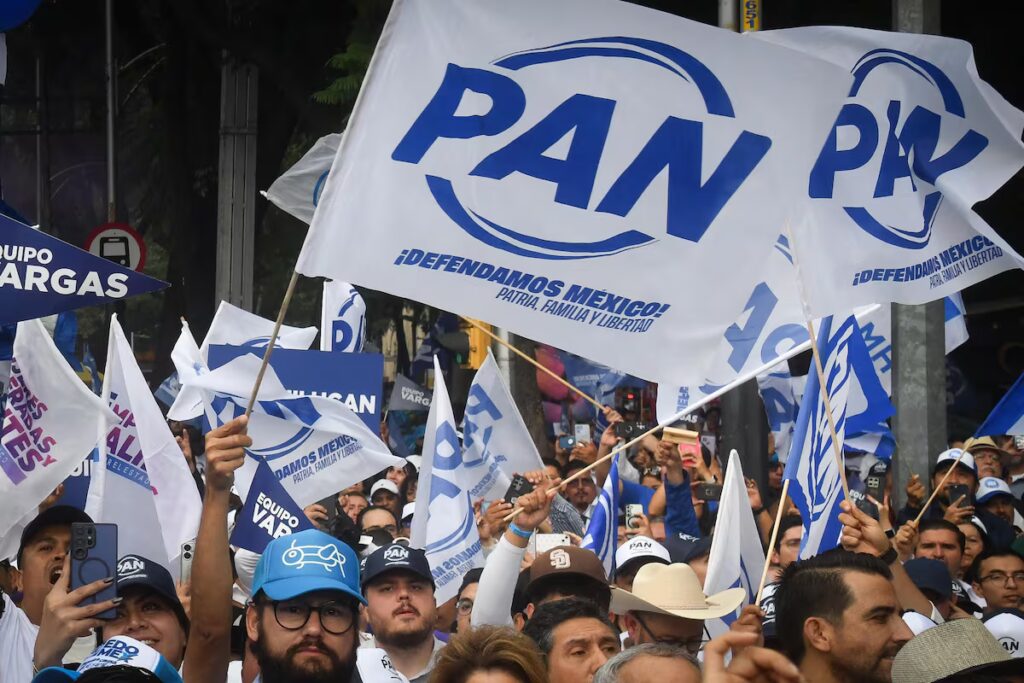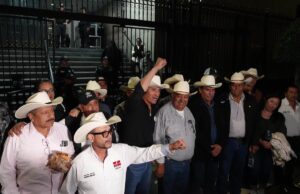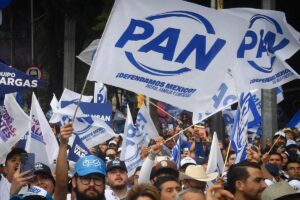
The interview with Jorge Romero, national president of the PAN in EL PAÍS, on the relaunch and next assembly of the most important opposition party, contains:
Lies: “(with the relaunch) the country has turned to us like never before”; definitions of coalition: “personal alliances with leadership yes, coalitions no”; he replies: he says they are preparing “an alternative project for the nation”; strategic sketch of the opposition: “we must understand that if each part of the opposition strives to conquer its own markets, the whole opposition will grow. There are people who do not understand this”; bravado: —The PAN bets on Morena’s division? Elia Castillo Jiménez asks him. “We don’t gamble, we just eat popcorn. We know this will be a determining factor for 2027,” Romero responds.
And, of course, the statement that took the eight columns and a good part of the “Jorge does not understand that he does not understand”, the one about the fact that the owner of TV Azteca could be his candidate in 2030: “I see Ricardo Salinas Pliego with perfect clarity. If he is encouraged, he moves forward and we see that he is growing in spirit, obviously we do not exclude him. We do not exclude anyone”.
This weekend the National Action Party will hold its national assembly. Five thousand delegates will be able to validate the change of direction that Romero, president for about a year, intends, on the one hand by opening the register of militancy to double it (as he told the journalist of this newspaper) and, on the other, by not excluding anyone as a candidate in 2030.
It is not true that the PAN has taken on an aspect never seen before after the announcement of the relaunch last month, where the notable thing is certainly the risky opening gamble of Romero, one of those accused of the closure that brought the current crisis to the blues.
The question after the interview is whether the opening will not turn against an opposition organization where the entrepreneurs who have arrived to occupy the engine room have always been looked at with suspicion. And none of them went from non-militant to pre-presidential candidate.
Even if he is not old, Romero has no excuse for political youth – he has been in this for more than 20 years – as justification for the fact that shortly before the assembly he inserted someone into the PAN succession deck who alone could have finished tarnishing the blue identity.
Will the PAN once again be a party of principles and training of cadres, or an opportunistic entity looking for someone to get it out of the quagmire, even at the risk of ending up being an appendage of the business conglomerate that includes one of the leaders of the television duopoly?
Is Salinas Pliego too big for PAN? Or did Romero really mean that his party is already too small to be self-sufficient and what it needs is even the substitution of a businessman with treasury problems?
Romero’s response on external candidates, including the owner of Elektra, contains many crumbs, material that will surely be destroyed in next Saturday’s meeting.
What did he mean by saying that he sees the owner of Banco Azteca “with perfect clarity”? Do you see the insults he directed at Citlalli Hernández, the current Women’s Secretary? Do you see and like the Milei-type epithets with which Salinas Pliego calls the left?
THE northern barbarians It was a way to rally the wave of entrepreneurs who at the time broke into the PAN to try to defend their interests.
There was everything in that current: from Manuel J. Clouthier (Sinaloa) to Francisco Barrio (Chihuahua), passing through Fernando Canales (Nuevo León) and Rodolfo Elizondo (Durango). And, of course, Ernesto Ruffo (Baja California), the first opposition governor.
These are characters who, after the disastrous six years of Luis Echeverría and José López Portillo, decidedly took the step to enter politics in the 1980s and saw in the PAN a vehicle that largely shared their economic vision, among other values.
Maquío died after the murky elections of 1988 and in the same year Vicente Fox (Guanajuato) became a federal deputy… the rest is the story of characters who, despite the impetus they gave to the PAN, did not necessarily appropriate or supplant it.
Of course, the wave of defrauded entrepreneurs like Francisco Barrio in Chihuahua offset the resistance they aroused within the PAN, promoting the victories of other blue and white candidates.
A certain balance was achieved, so to speak, between the traditionalists and the stalwarts, in which several PAN leaders served at once as arbiters and promoters of that mix. Although it is true that there are those who believe that National Action has never recovered from that business drift and that, starting from Germán Martínez (2007-2009), there has never been a national leader of the PAN’s doctrinal persuasion. And, similarly, many of the corruption scandals involving PAN leaders were caused by improvised businessmen such as politicians.
As Romero announced in October when announcing the relaunch, Acción Nacional will begin an open reflection, in which it will explore the return to origins and adaptations to adapt to the environment in which Morena is advancing in the establishment of a new and harmful hegemony.
The path towards this reflection very early encountered a dilemma. By quoting Romero in the terms he used in the interview with Salinas Pliego, and even saying “we don’t exclude anyone” (i.e. not even Eduardo Verástegui), he puts a yoke on PANism.
Romero would repeat the mistake of Marko Cortés, who ceded the party to Alito Moreno’s discredited PRI in the 2024 process alliance. Salinas Pliego has the right to try to defend his interests as he sees fit. Should the NAP be a person’s tool rather than an industry’s tool?
In Romero’s words, instead of seeing internal strength, he sees the need to embrace those who denounce, with a personal agenda, President Sheinbaum and his movement (after having been their ally, among other things).
THE brave northerners They made inroads into the unions and before national battles they lost to the dirty PRI in governorates, like Maquío in Sinaloa in 1986. The history of the PAN shows that businessmen and PANism can rhyme with success. Only it was known who was driving the vehicle, the one for which Romero today seems urgent, and so soon, to hand over the keys so that it can be manned.




